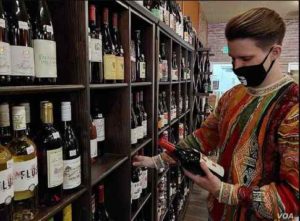
ALEXANDRIA, VA – Business is booming for alcohol in the United States during the coronavirus pandemic as Americans on lockdown battle boredom and anxieties at home.
“People who would usually buy one bottle of wine are going out the door with several bottles, or even a case,” said Davis Wills, a manager at UnWined, a wine and beer shop in Alexandria, Virginia, a Washington suburb.
UnWined’s sales, which now include curbside service and home deliveries, have increased at least 30 percent in recent months, according to Wills, as customers continue to hunker down in their homes.
“People are concerned about getting the virus,” he said, “and since many of them are teleworking in this area, it’s easier for them to have a glass of wine earlier in the day than they normally would.”
“It’s given us more freedom to drink when we want to and not feel guilty about it,” customer Sarah Robinett said while shopping for wine.
When asked if she’s drinking more than usual, another customer, Andrea Anderson said, “Well, maybe a little bit.”
And that’s just the problem, according to George Koob, director of the National Institute on Alcohol Abuse and Alcoholism at the National Institutes of Health in Bethesda, Maryland. “Although about 70 percent of Americans drink,” he said, total consumption has significantly increased across the country.
Because the pandemic is causing isolation and anxiety, Koob said, “Individuals may be increasing their alcohol consumption to obliterate those negative feelings, using it as a coping mechanism.” He’s concerned that the “dark side” of alcohol consumption could rise among the 14.5 million people in the United States with an alcohol use disorder.
Julia Chester, an associate professor at Purdue University, studies alcohol use disorders. Chester says she thinks that “after the pandemic subsides, it may be hard for some people to stop their pattern of problematic drinking.”
“Since alcohol is so ingrained in our culture,” she said, it would be hard to shut down the distributors and establishments that serve liquor.
Considered “essential” businesses, liquor stores generate huge tax revenues that comprise a substantial portion of many state government budgets. Liquor shops in 49 of America’s 50 states, as well as the nation’s capital, have remained open during the pandemic. Pennsylvania shut down its liquor stores but when residents began traveling to nearby states to buy alcohol, authorities allowed online sales and curbside pickup. On Friday, the state began allowing customers to shop in some of the stores.
Some states, like Maryland, are citing financial reasons for keeping beverage retailers open. A state official said the decision was economically driven and in step with allowing restaurants to sell alcohol through carryout and delivery.
Other states, like Delaware, say keeping alcohol available is an essential component of health care, since the closure of liquor stores could have an adverse impact on people struggling with substance abuse.
Koob concurred, adding that that a sudden surge in people suffering alcohol-related withdrawal symptoms would put “a significant strain on our medical system right now.”
At the same time, he warned against normalizing excessive drinking, noting that since “alcohol suppresses the immune system, misuse could possibly make someone more vulnerable to the coronavirus.”
The World Health Organization suggests avoiding alcohol altogether since “consumption can exacerbate health vulnerability.” For people who think loading their bloodstream with alcohol will protect them from the coronavirus, the organization has a simple message: it just isn’t true.
Source: VOA
